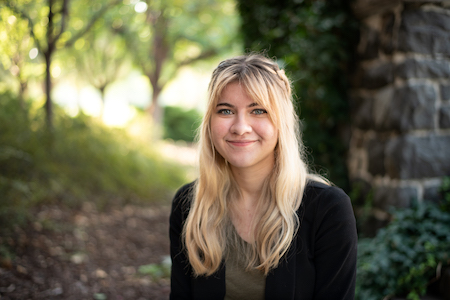Idaho State Economics Student Wins Best Undergraduate Paper at International Research Conference
November 11, 2021

Idaho State University student Gwyneth Donahue's research on the wage gap existing between immigrant and native workers in the United States has earned her the award for Best Undergraduate Paper aat the International Atlantic Economics Society conference.
As part of the award, Donahue's research will be published.
Donahue, a junior studying economics in the College of Business, began her research as an assignment in professor Dr. Iris Buder’s econometrics course in spring 2021.
“Econometrics applies statistical and quantitative methods to analyze business and economic phenomena,” Buder said. “When Gwyn proposed her research project, I could already see the potential for her idea and she continued to put a lot of effort into developing her theoretical model, which was grounded in her thorough research of the literature. After Gwyn submitted her final research paper for the class, it truly was one of the best undergraduate econometrics papers I had ever read.”
Buder suggested that Donahue continue her work on the paper throughout the summer and submit it to the IAES for entry into the contest.
Donahue said her motivation for choosing the topic was to explore the underlying cause of the wage gap and whether or not it can be explained by educational or occupational choices or the potential for discrimination against immigrants.
“While education, occupation and other demographic attributes were shown to contribute to the wage gap [between immigrant and native workers in the U.S.], the paper also demonstrates that there remains a portion that is unexplained by these variables, which can likely be attributed to discrimination,” said Donahue.
Donahue said that she also found that the wage gap does fade the longer an immigrant is in the U.S. “Though this wage ‘convergence’ is not consistent among every occupation,” she said, “indicating that immigrants in unskilled occupations have a higher wage gap with natives versus immigrants in skilled occupations.”
Throughout the research process, Donahue was able to gain experience using two methods of research including the Ordinary Least Squares Regression analysis (OLS) as well as the Blinder-Oaxaca Decomposition which Donahue said attributed to the greatest takeaways of the experience. She was also exposed to a greater understanding of the structure and presentation of academic articles.
“[I was able to learn] how to conduct proper research using statistical analysis and how to effectively communicate the findings. I learned how to utilize statistical analysis and statistical software, and how to apply these tools to help answer economic questions, a skill that will undoubtedly be applicable in the future.” Donahue said.
After participating in the conference, Donahue said that the experience only enhanced her plans to join academia in the future. She said that the opportunity to compete internationally in addition to publishing her research will be a valuable attribute to add to her Ph.D. program applications once she graduates.
Buder explained that these types of experiences are beneficial to students for a variety of reasons but are especially noteworthy to those planning to pursue graduate school. Buder said that conducting research at the undergraduate level can not only demonstrate a student’s cognitive and writing skills to graduate schools, but is also a good opportunity to help guide the students toward their ideal graduate program based on their research interests.
“Gwyn’s hard work on this research project paid off in a huge way – getting published as an undergraduate is quite a significant achievement,” Buder said.
Categories:

